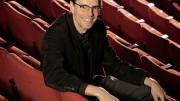“I’ve always been an impatient person,” says Martin Puchner, Wien professor of drama and of English and comparative literature. His impatience has served him well. A whirlwind of energy, the 43-year-old Puchner has already written three books—on theater, modernist literature, and philosophy—and edited many more, including the six-volume, 6,000-page third edition of the Norton Anthology of World Literature (2012). That “dizzying, impossible” project seemed an “insane endeavor, yet I found the scope of it thrilling,” he says; with seven co-editors and 10 consultants spread across the globe, e-mails poured in at any hour, day or night. Born in Nuremberg, Germany, he attended an alternative, Waldorf school and acted, directed, and composed music for many theatrical productions in high school and college. A restless, passionate traveler, Puchner did undergraduate work at Konstanz in Germany, Bologna in Italy, and the University of California at Santa Barbara and Irvine. He never actually received a bachelor’s degree, but earned a Harvard Ph.D. in comparative literature in 1998. While teaching at Columbia from 1998 until 2010, he evolved into a scholar of theater. He’s been at Harvard since then; as chair of the Committee on Dramatics, he’s helping to shape a new concentration (if not department) in theater. Puchner plays piano, violin, and viola for enjoyment, and lives with his longtime companion, professor of English Amanda Claybaugh, while globetrotting to research his next book, on the relation of literary works to geography. “Literature is invading the world, transforming the world,” he says, “naming places, and changing people’s relationship to where they live.”
Martin Puchner, author and professor of drama and of English
Martin Puchner, author and professor of drama and of English
The English professor has already written three books and edited the 6,000-page third edition of the Norton Anthology of World Literature.

You might also like
Harvard Faculty of Arts and Sciences Appoints a New Finance Dean
Warren Petrofsky joins at a crucial moment when the FAS is dealing with a $350 million deficit.
Harvard Graduates Can Donate Directly to Their Houses on Housing Day
A new initiative encourages small-dollar donations for improving student life.
A Cap on A’s at Harvard? Students and Faculty Raise Concerns at Town Hall
Dozens debate the grade inflation proposal that faculty will discuss next week.
Most popular
Explore More From Current Issue

A New Landscape Emerges in Allston
The innovative greenery at Harvard’s Science and Engineering Complex

These Harvard Mountaineers Braved Denali’s Wall of Ice
John Graham’s Denali Diary documents a dangerous and historic climb.






